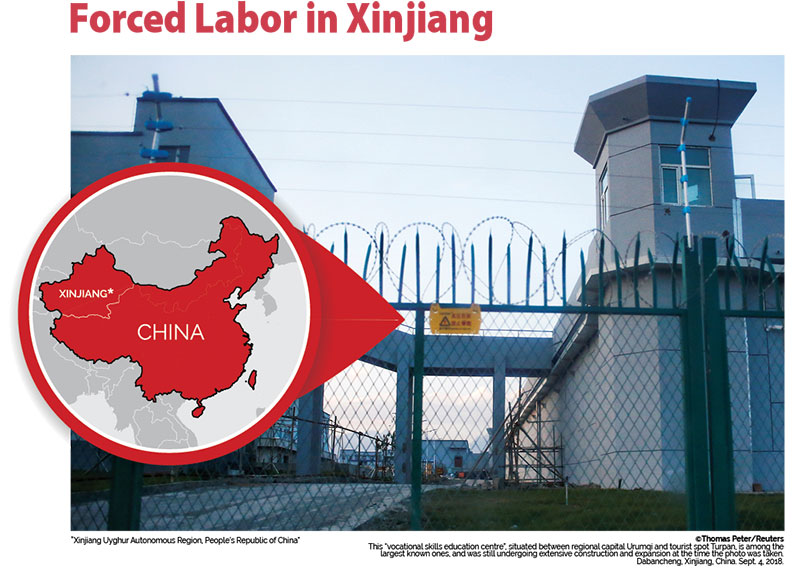- A new study shows that the world's largest solar manufacturers are using forced labor of Uyghurs.
- The Breakthrough Institute reports that Uyghur workers extract and process raw materials under harsh conditions.
- The use of Uyghur forced labor could threaten the growth of the global solar energy supply chain.
The global solar panel industry has a human rights problem, according to a new study by the Breakthrough Institute based on more than 200 government documents, media reports and scientific articles.
The Uyghurs, a Muslim minority in China's Xinjiang, are forced to make polysilicon, a key component of solar panels, under a government-sponsored labor transfer program, the study reports. This is the situation in the last two years. These regulations forced minority workers to work in factories under "vague" threats of arrest and even imprisonment, the researchers said.
The Biden administration called China's treatment of Uighurs "genocide" in its 2021 human rights report.
Chinese polysilicon smelters are concentrated in the Xinjiang region and accounted for more than 42 percent of global solar production last year, according to the study.
GCL Technology Holdings Ltd., which researchers say produces 8.4% of China's solar polysilicon output, and other companies helped evacuate more than 1,800 workers from Khotan and invited them for military training. Other polysilicon companies, such as East Hope Group, Xinjiang-based Dago New Energy Corporation and Jinte Energy, are involved in forced labor, according to the investigation report.
Dago New Energy Corp. spokesman Kevin He told Insider that the Xinjiang-based manufacturer does not employ Uighur workers and said it is not required to hire workers through a relocation program. Chinese labor
“Why do people think the government would pay to patronize a company that uses forced labor? Wrote in the letter. "What does the government get?"
GCL Technology Holdings Ltd, East Hope Group and Jinte Energy did not respond to requests for comment.
Researchers say Uyghur workers will work in potentially dangerous conditions for low wages.
According to a research report, Xinjiang's manufacturers specialize in primary production, which includes mining, melting and cutting silicon into wafers used in photovoltaics, which convert sunlight into energy. The rest of the solar cells, such as solar panels and photovoltaic cells, are assembled in other factories in China, the researchers wrote.
Although there is insufficient data to show how many Uyghurs make up the solar plant workforce, the laid-off workers are often hundreds of miles away from their hometowns, separated from their families and their children, according to the study.
According to the report, workers are forced to work long hours in potentially dangerous conditions for low wages and undergo mandatory political induction as part of the retraining process.
Uighurs also work in coal-fired power plants that power polysilicon devices, researchers say. The researchers also wrote that the photographs they obtained showed that the workers were not wearing the necessary personal protective equipment to protect themselves from occupational hazards.
The researchers concluded that the solar energy companies are "part of the Chinese Communist Party's broader campaign of systematic repression against Uighurs, Kazakhs, Kyrgyz and other minorities in the Xinjiang region."
China's dominance of global solar energy supply chain could slow global transition to clean energy
Many countries, including the United States, depend on Chinese imports for most of their panels, Bloomberg reported. According to the International Energy Agency, China accounts for about 80% of the global solar power market at all stages of production. China's solar energy exports rose 60 percent to $28 billion last year, according to China's Ministry of Industry and Information Technology.
Seaver Wang, a researcher involved in the study, told Insider that China's dominance of the global solar market could increase the risk of solar supply chain disruption due to geopolitical disputes. Extreme weather and changes in the economy.
China's influence could also hinder global expansion of the solar industry if local manufacturers outside China cannot compete with cheaper labor from Xinjiang in the long term, Mr. Wang said. It could even damage the reputation of the solar PV industry, he says, deterring investors from financing companies they see as unethical and reducing the switch from fossil fuels to solar power.
In June 2021, the United States passed a law banning the import of certain solar energy products from the Xinjiang region, which could make solar energy more expensive for Americans. The UK and Australia are also considering banning exports to Xinjiang, although no action has been taken.
Researchers call on solar companies to stop doing business with Xinjiang farmers
Although solar industry groups have adopted protocols and signed pledges to test products that violate labor laws, researchers have found that these measures are not enough to prevent manufacturers from dying at the end of the supply chain. Wang said.
Researchers have called on energy companies to stop doing business with Xinjiang producers. They call on governments to create public programs like Biden's plan to triple solar power generation in the U.S. by 2024.
"We believe it is important that the cleantech industry now sends a clear message that it will not tolerate buying from manufacturers in Xinjiang who are complicit in the region's repressive politics," Wang said.
Correction: This article has been updated to clarify that, according to researchers, multiple companies helped evacuate a total of more than 1,800 people from Khotan.



